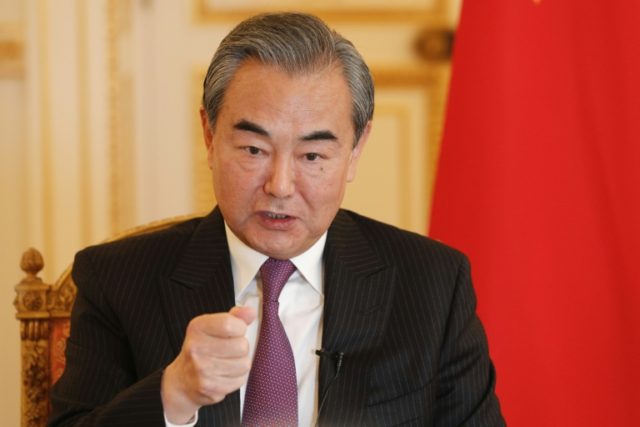Chinese Foreign Minister Wang Yi went on an explosive rant Friday disparaging the United States for condemning human rights abuses in China, casting a pall on optimism triggered by reports of a Washington-Beijing trade agreement.
President Donald Trump has led an economic policy shift resulting in diminished two-way trade, imposing tariffs on key Chinese products in an attempt to negotiate a deal that would help American agriculture and manufacturing flourish. Shortly after Wang delivered his remarks about “paranoid” American officials, Trump and the Chinese news agency Xinhua both reported that the two sides had agreed to a phrase one trade agreement.
Wang did not discuss economic negotiations, instead highlighting efforts in Congress to aid the peaceful Hong Kong pro-democracy movement and condemn China’s use of concentration camps to commit genocide against Muslim ethnic minorities in westernmost Xinjiang province.
“We hope that the U.S. side will promptly calm down, take a rational view towards China and the world, and work together with China to realize a non-confrontational, mutually respectful, win-win path towards peaceful co-existence and mutual benefit,” Wang asserted on Friday, according to the South China Morning Post. Wang went on to accuse the United States of having “slandered China’s social system, development path, and cooperation with other countries.”
“Such behavior is almost paranoid, and is indeed rare in international exchanges, seriously damaging the hard-won foundation of mutual trust between China and the United States, and seriously weakening the United States’ international credibility,” Wang declared in remarks summarizing the work his ministry engaged in throughout 2019 and looking forward to the next year.
Elsewhere in his remarks, Wang urged his diplomats to “resolutely fight against external forces that interfere in Hong Kong’s affairs,” by which he meant support the ongoing protest movement against the Communist Party there, indicating that American policies to aid the pro-democracy protesters are part of the “paranoid” behavior Wang condemned. The United States passed the Hong Kong Human Rights and Democracy Act in late November, calling for the annual review of Hong Kong’s special trade status in regard to human rights there and safeguards for individuals who participate in the protests who later apply for U.S. visas. Only one member of Congress, Rep. Thomas Massie (R-KY), voted against the bill, a rare moment of unity in modern American politics.
The Chinese government condemned the bill as needless foreign intervention in defense of violent “rioters.” The protesters took to the streets for a “Thanksgiving” rally, waving American flags and carrying portraits of President Donald Trump.
Wang’s remark that the United States has “slandered China’s social system” also appears to refer to another piece of legislation, the UIGHUR Act, which recently passed the House of Representatives and is expected to have a similarly easy path to becoming law as the Hong Kong Human Rights and Democracy Act. The UIGHUR Act condemns the establishment of concentration camps for Uyghur, Kyrgyz, Kazakh, and other ethnic minorities in Xinjiang province and acts to curtail the import of items manufactured by slaves in those camps. China has invested heavily in selling global corporations on the economic value of using slave labor in its “made in Xinjiang” campaign and generates significant profit from the practice.
Survivors of the labor camps have testified to a litany of other human rights atrocities committed there besides slavery. Those who have survived say they have been subject to extreme torture like electrocution and submitted to forced sterilization surgeries as well as forced to take birth control. Some say the rape of imprisoned men and women both happens on a regular basis and extensive evidence suggests China has killed some interned in the camps to harvest and sell their organs on the black market.
Wang’s tone differed significantly on relations with America from President Trump’s on Friday, who announced on Twitter that both sides had agreed to a “very large Phase One” economic deal.
According to Trump, China “agreed to many structural changes and massive purchases of Agricultural Product, Energy, and Manufactured Goods,” but Washington would keep 25 percent tariffs on certain Chinese goods in place.
“The Penalty Tariffs set for December 15th will not be charged because of the fact that we made the deal. We will begin negotiations on the Phase Two Deal immediately, rather than waiting until after the 2020 Election,” Trump added. “This is an amazing deal for all. Thank you!”
According to Xinhua, the current state of the “phase one deal” includes provisions on “intellectual property rights, technology transfer, food and agricultural products, financial services, exchange rate and transparency, trade expansion, bilateral assessment and dispute settlement.”
Xinhua celebrated the deal as helping “enhance intellectual property rights protection, improve the business environment, expand market access, better safeguard the legitimate rights and interests of all companies including foreign firms in China, and protect the legitimate rights and interests of Chinese firms in their economic and trade activities with the United States.”
Xinhua’s cheer did not spread to the foreign ministry.
“Like State Councilor Wang Yi stated in his speech at the Symposium on the International Situation and China’s Foreign Relations in 2019 this morning, the U.S. wrong understanding of China is the root cause for its wrongdoing and that the U.S. outlook on China has gone astray,” spokeswoman Hua Chunying told reporters during her daily briefing. “We hope the U.S. will calm down and adopt a rational outlook on China as soon as possible.”

COMMENTS
Please let us know if you're having issues with commenting.